Structured data in JSON-LD format allows Shopify stores to appear in Google with enhanced elements such as product ratings, pricing, and availability. These enhancements, often called rich results, help potential customers understand your store at a glance and can improve click-through rates.
Default coverage often leaves gaps like missing FAQ, breadcrumb, or organization details, which reduces the store’s visibility potential.
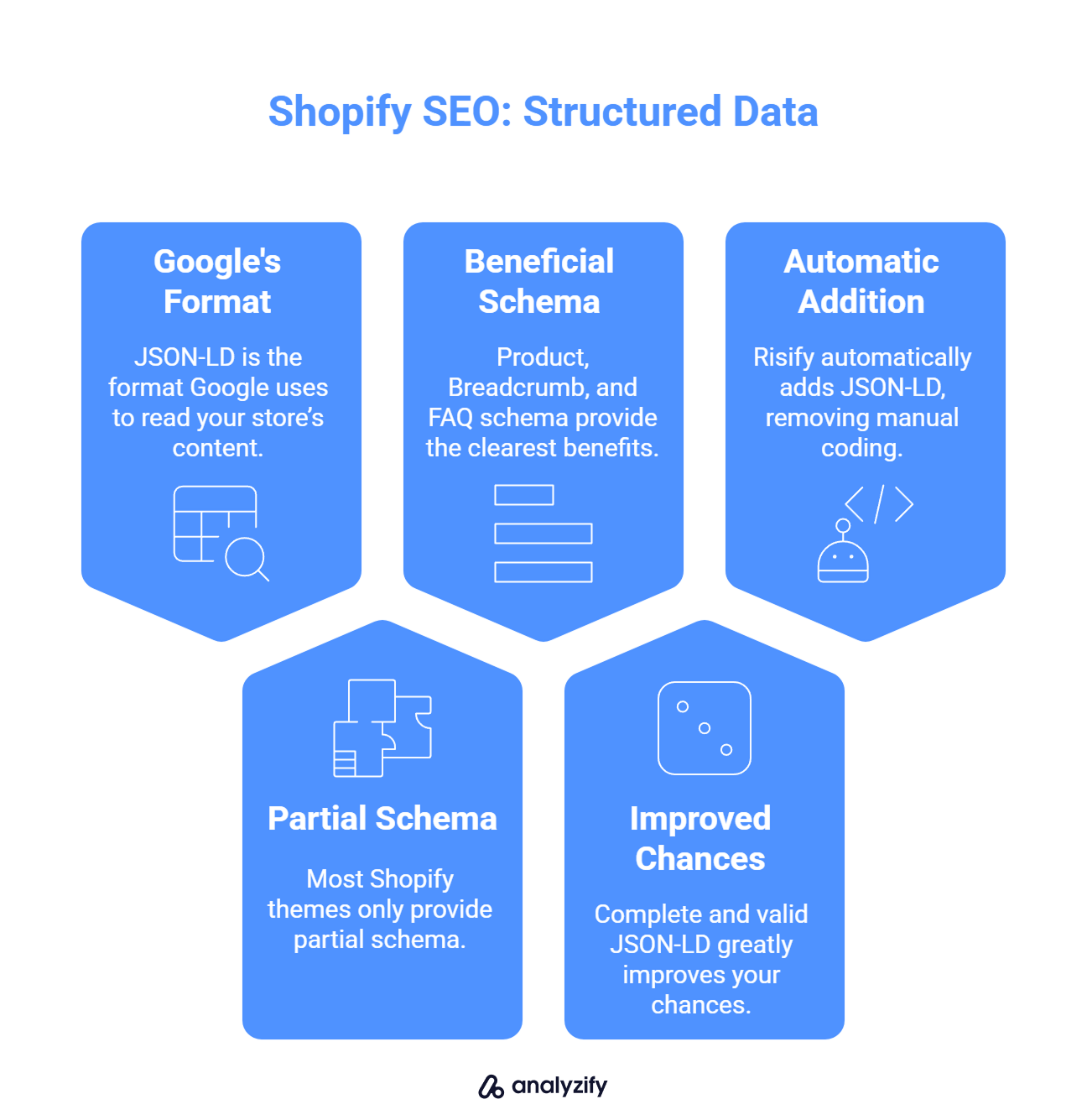
Key Takeaways
JSON-LD is the format Google uses to read your store’s content and qualify it for rich results.
Most Shopify themes only provide partial schema, which means your store might not be fully eligible for enhanced search results.
Product, Breadcrumb, and FAQ schema provide the clearest benefits for Shopify SEO.
Rich results are never guaranteed, but complete and valid JSON-LD greatly improves your chances.
Risify automatically adds JSON-LD to the correct pages, removing the need for manual coding and reducing errors.
What JSON-LD Is and Why It Matters
JSON-LD (JavaScript Object Notation for Linked Data) is the structured data format recognized by Google, Bing, and other search engines. Its purpose is to provide clear information about the type of content on a page. For an e-commerce store, this might include:
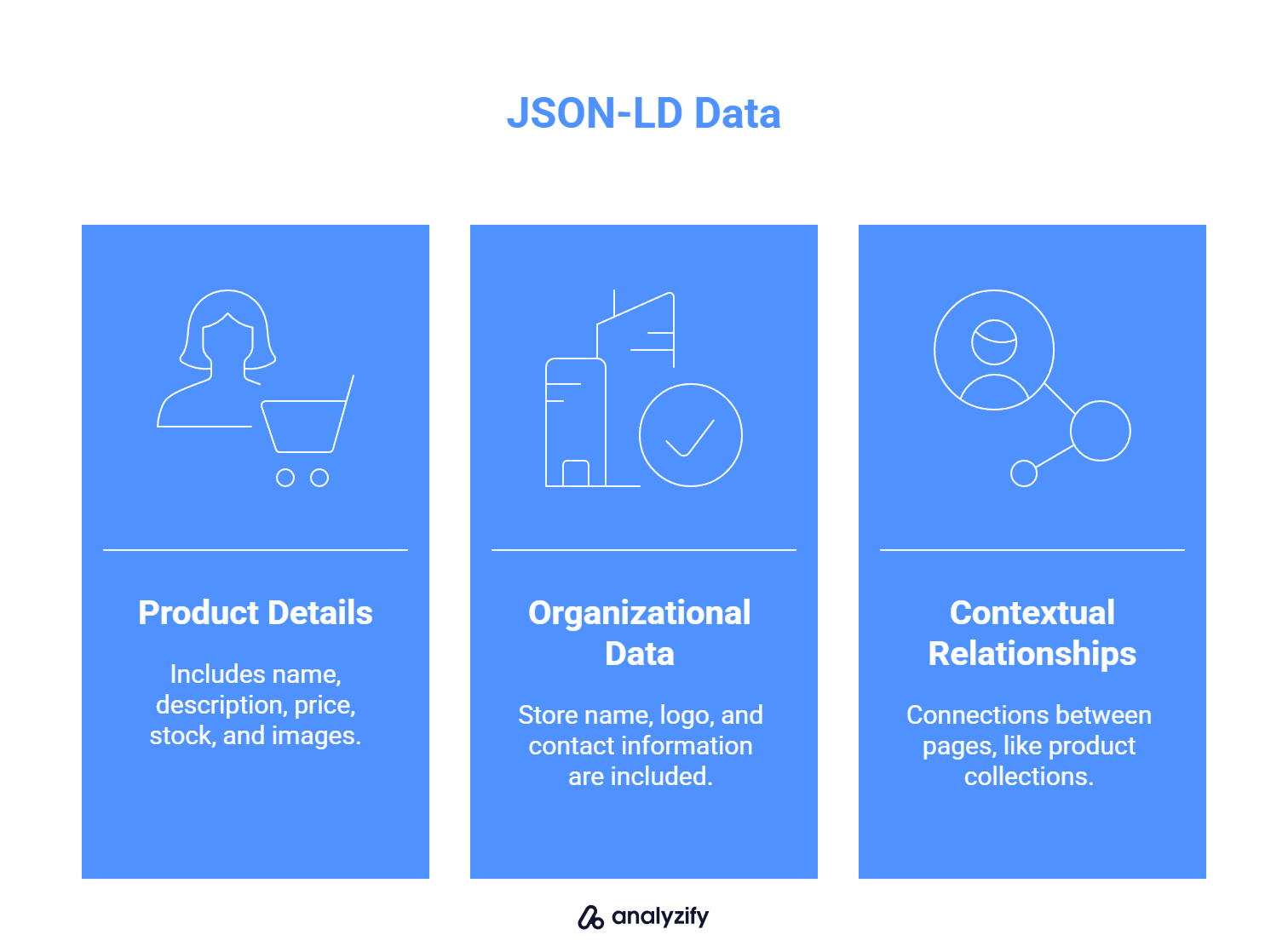
Product details such as name, description, price, stock status, and images
Organizational data like your store name, logo, and contact information
Contextual relationships between pages, for example, which collection a product belongs to or how FAQs relate to the product page
Search engines read this data in the page source rather than relying on visual elements. When they can interpret the information clearly, they can display enhanced search results like product snippets, review stars, or FAQ dropdowns.
Without JSON-LD, search engines rely entirely on guessing from page content. This can lead to missed opportunities in search visibility and sometimes incorrect or incomplete results.
How Risify Helps
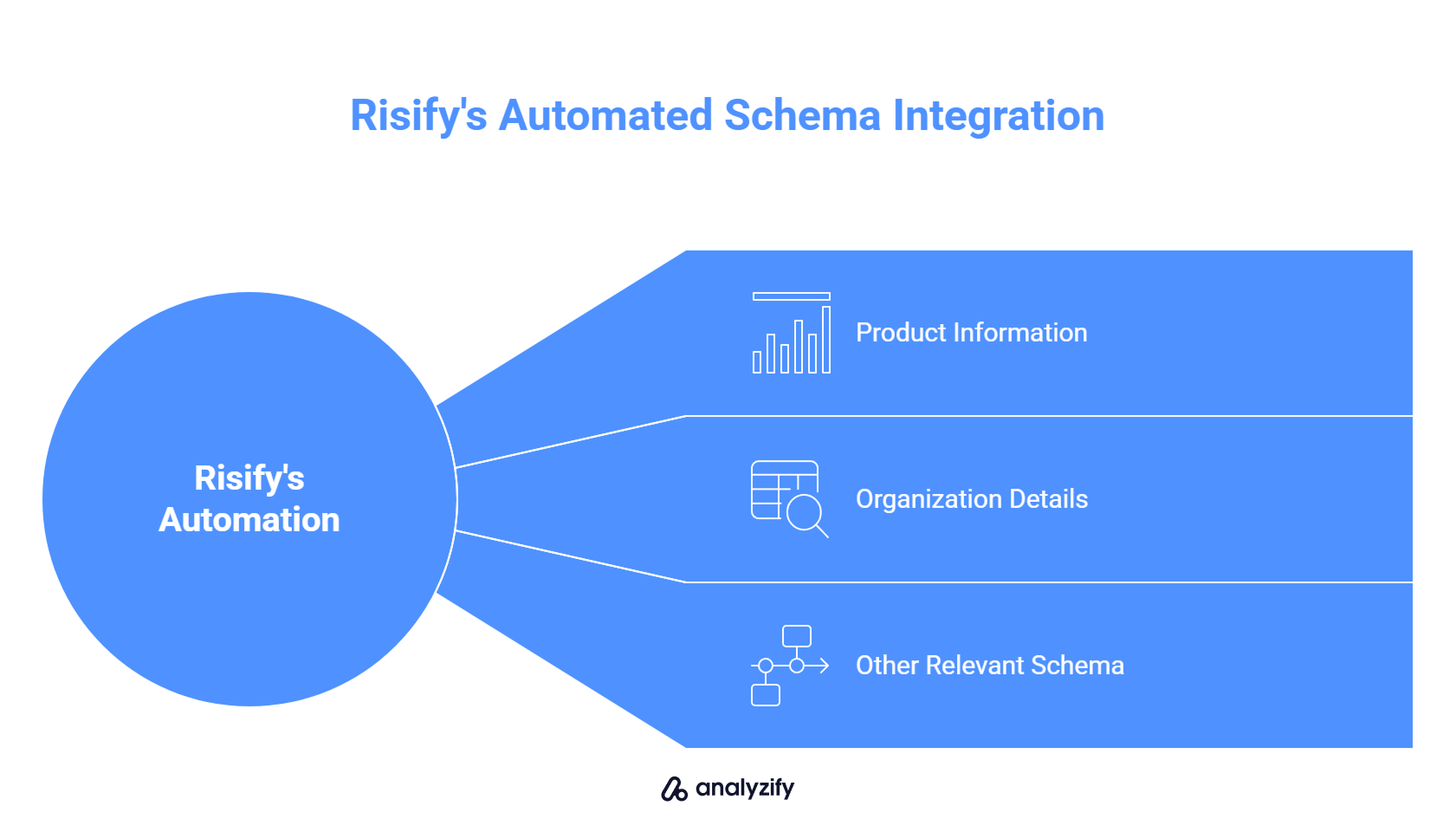
Risify automates the addition of JSON-LD to the right Shopify page types. It dynamically outputs product information, organization details, and other relevant schema without requiring manual editing.. This ensures that every eligible page is prepared for search engines to recognize and potentially reward with rich results.
What Rich Results Look Like for Shopify Stores
Rich results are enhanced Google search listings that provide extra details about your store directly in the search results. For Shopify merchants, they can make a major difference in visibility and click-through rate because shoppers get helpful information before visiting your site.
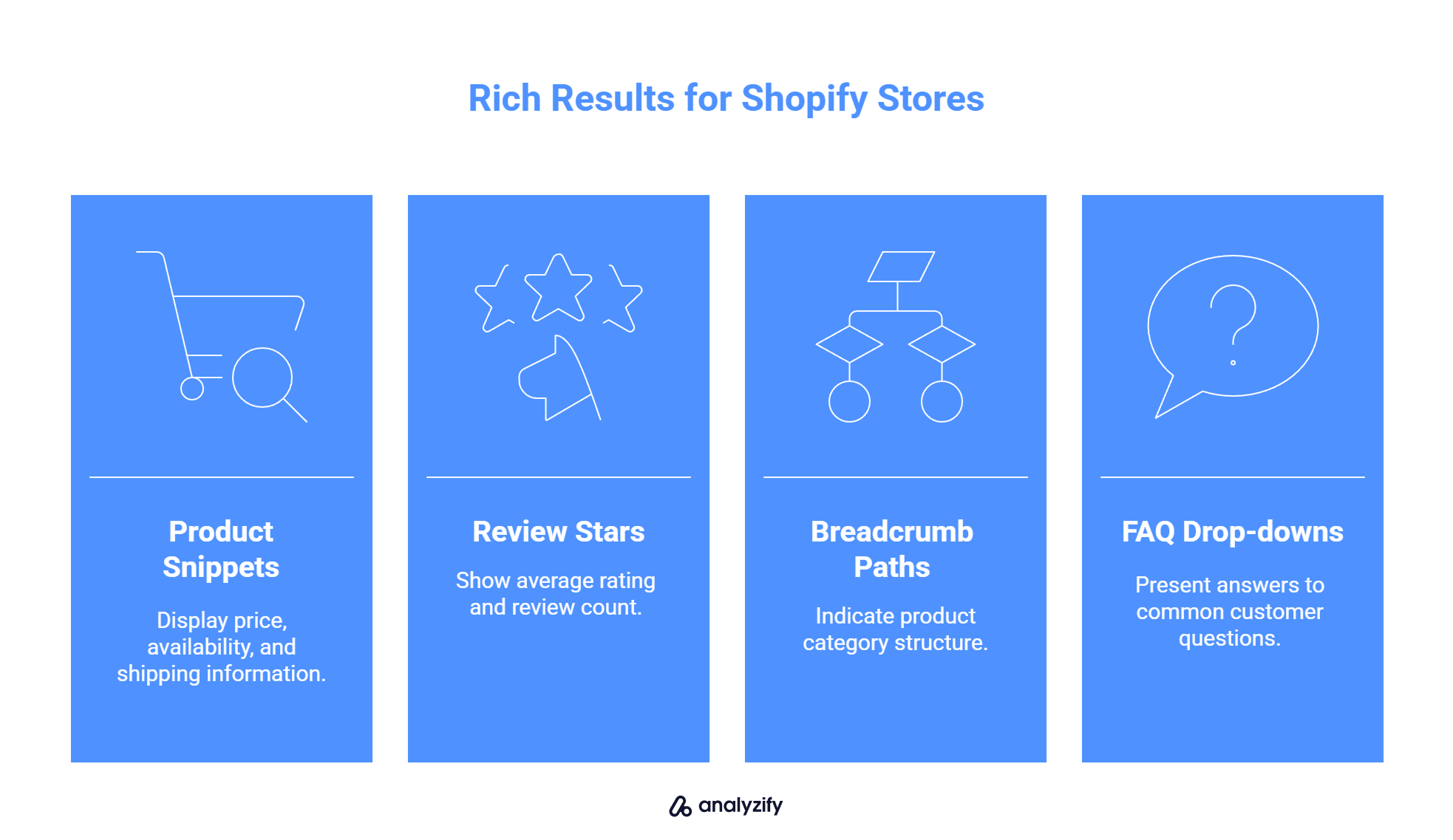
Common examples of rich results for Shopify stores include:
Product snippets – Show price, availability, and sometimes shipping or return info directly under the listing.
Review stars – Display the average rating and review count, increasing trust and click likelihood.
Breadcrumb paths – Indicate the product’s category structure, helping users and Google understand the site hierarchy.
FAQ drop-downs – Present answers to common customer questions without requiring the user to click through.
These enhancements make your store’s listing stand out against plain title-and-description results. While rich results can improve traffic quality and clicks, they are only available to pages that provide valid structured data and meet Google’s eligibility criteria.
How Risify Helps
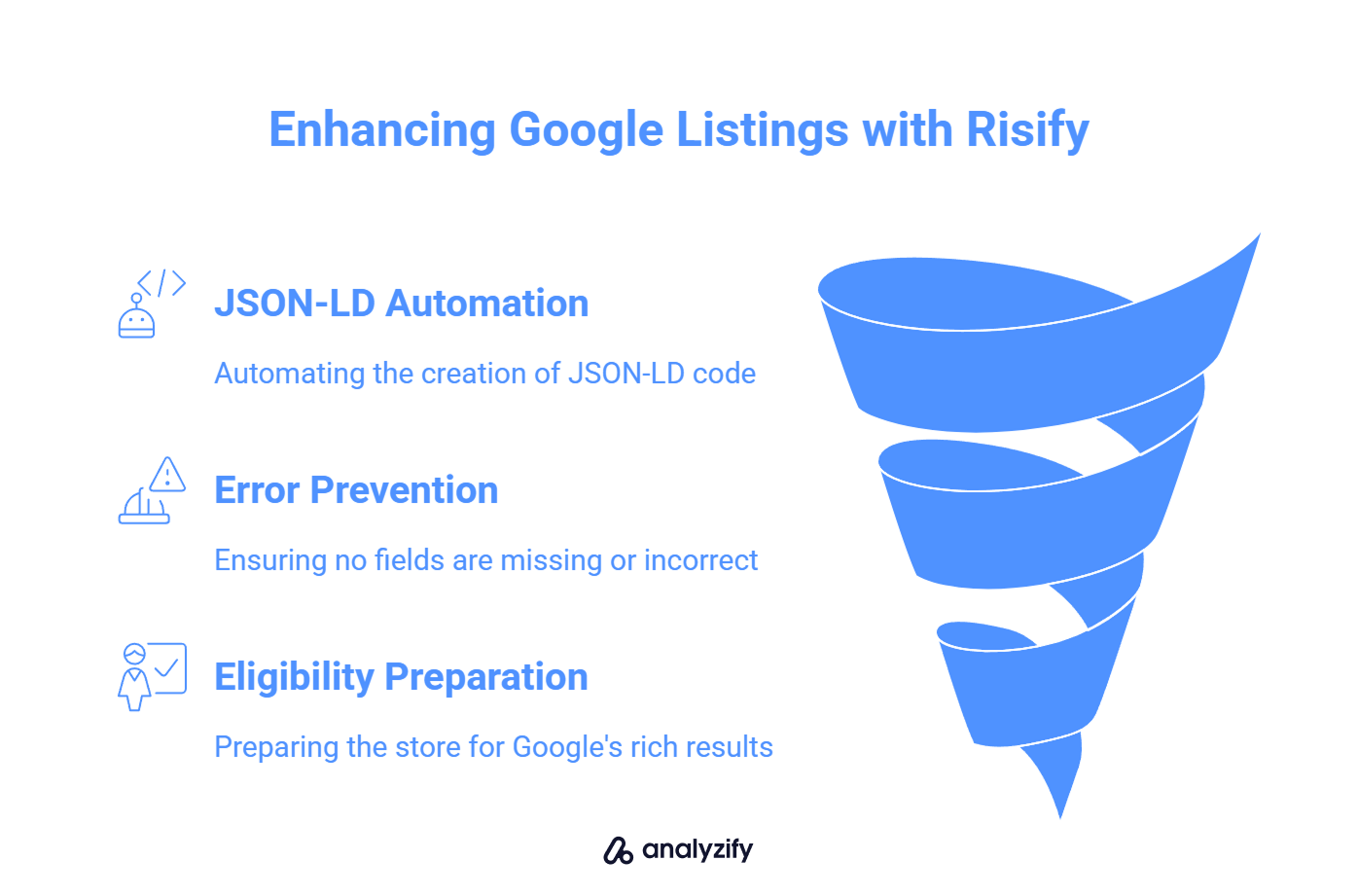
Risify ensures that the schema required for these rich results is correctly implemented across your product, collection, and FAQ pages. By automating JSON-LD for these elements, it prepares your store for eligibility without the risk of missing fields or errors that can prevent Google from displaying enhanced listings.
Bonus: How to Add Subcategory Navigation to Your Shopify Collection Pages
Why Shopify Does Not Fully Handle Schema By Default
Shopify themes often include some basic JSON-LD, but it rarely covers everything a store needs for strong SEO visibility. Default themes like Dawn usually provide minimal schema for products, articles, and the homepage. However, there are several gaps that can limit your eligibility for rich results:
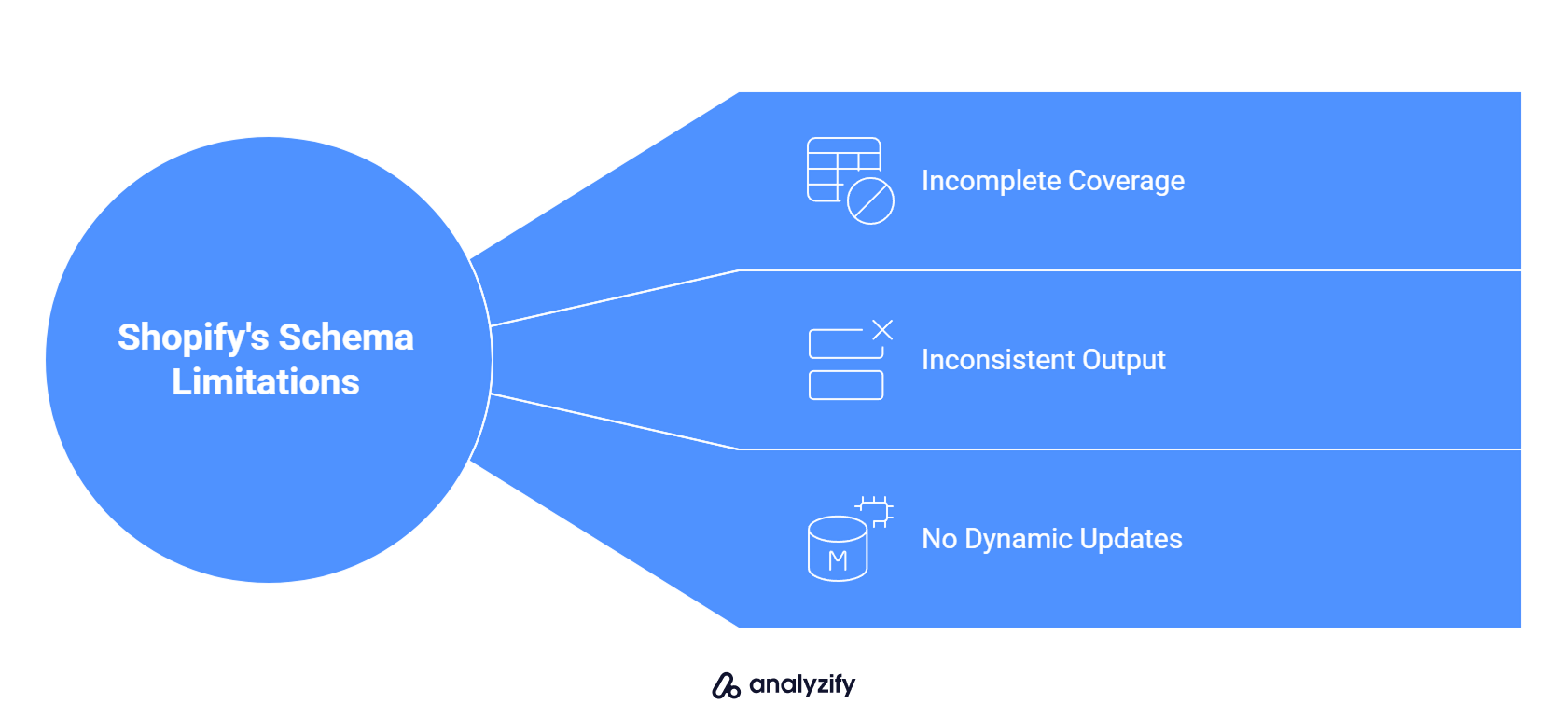
Incomplete coverage – Many themes do not include schema for breadcrumbs, FAQs, or organizational details.
Inconsistent output – Third-party or older themes may produce partial or outdated markup that does not pass Google’s tests.
No dynamic updates – When product details, collections, or FAQ content change, the theme’s schema may not automatically reflect the updates.
These gaps mean that a store could appear in search without enhanced features, even if the products and content are high quality. In some cases, invalid or conflicting schema can also lead to warnings in Google Search Console.
How Risify Helps
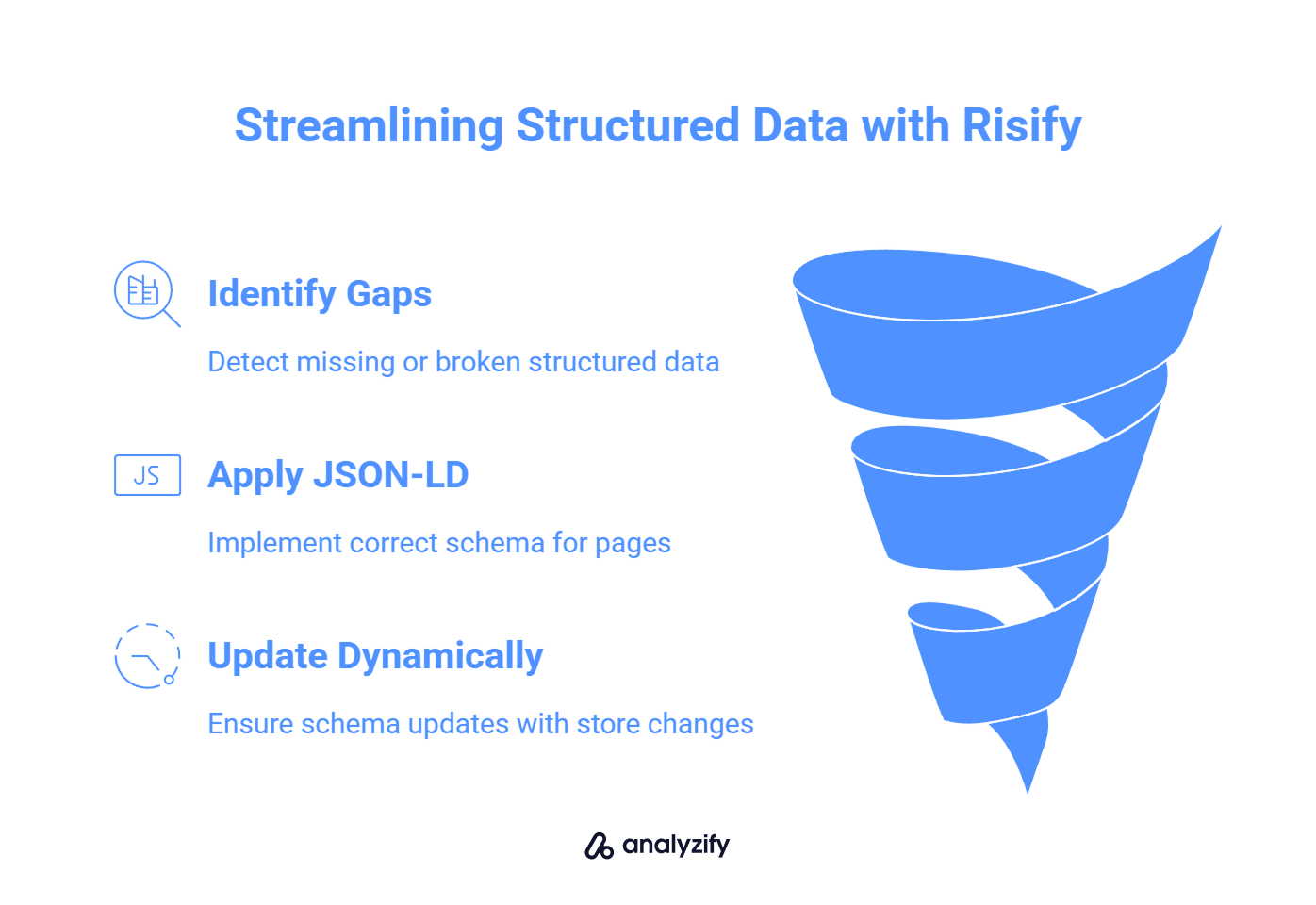
Risify fills these gaps by providing complete JSON-LD coverage for your store. It ensures that all key page types – including product, FAQ, and breadcrumb pages – receive the correct schema, updated dynamically as your store changes. This reduces the risk of missing or broken structured data without requiring any manual adjustments to your theme.
High-Impact Schema Use Cases for Shopify
Not all structured data has the same effect on Shopify SEO. These three schema types deliver the most noticeable benefits for visibility and eligibility for rich results.
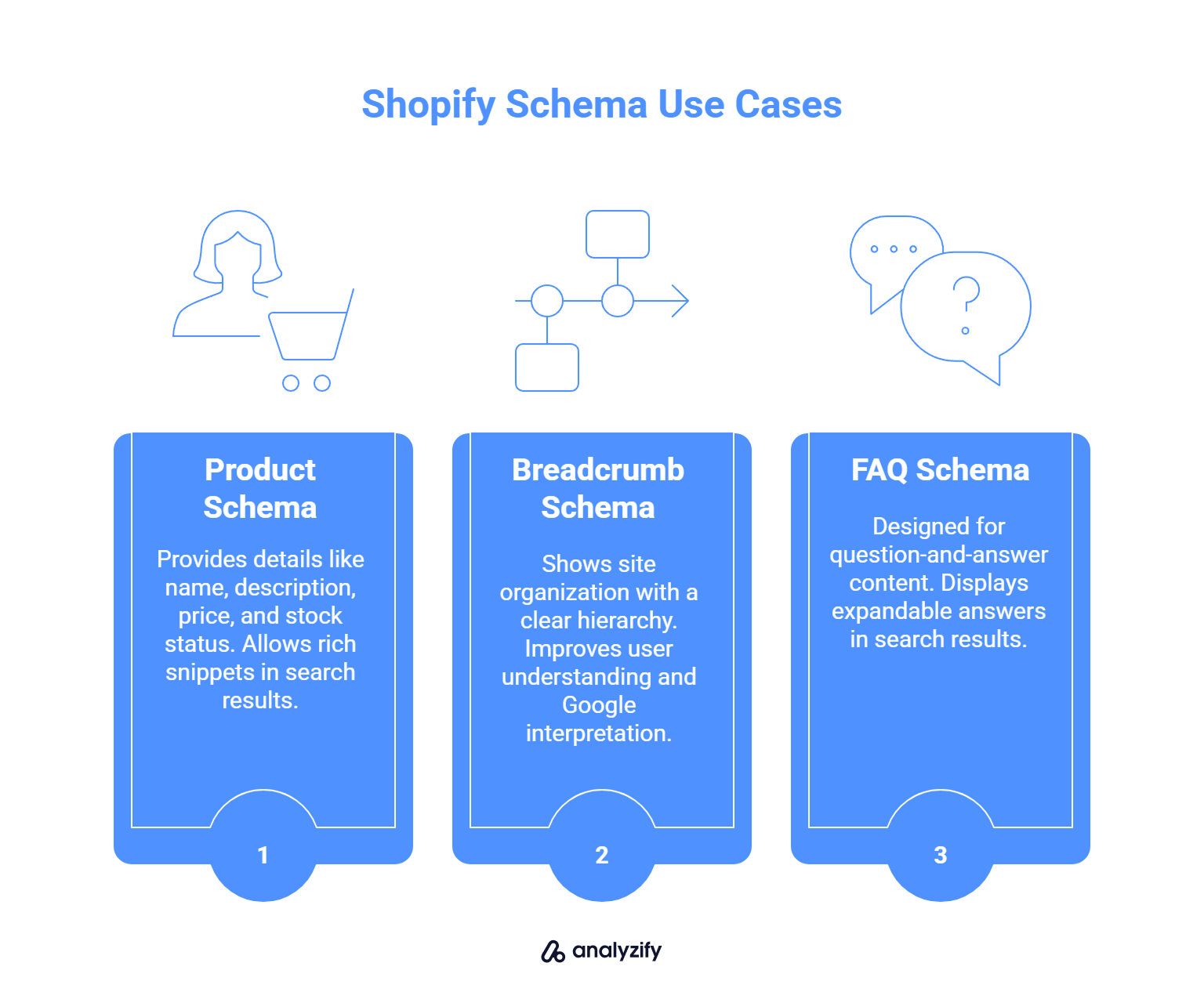
Product Schema
Product schema provides search engines with critical details like product name, description, price, stock status, images, and variant information. This allows Google to recognize a page as a product and display rich snippets that may include pricing, availability, and review stars directly in search results.
Breadcrumb Schema
Breadcrumb schema shows search engines how your site is organized. It creates a clear hierarchy of categories and product pages, which can appear as a clickable breadcrumb path in search results. This improves user understanding and helps Google interpret your store structure more accurately.
FAQ Schema
FAQ schema is designed for pages that include question-and-answer content. When implemented correctly, it allows Google to display expandable answers directly in search results. This can increase visibility, reduce customer friction, and improve click-through rates by pre-answering common questions.
How Risify Helps
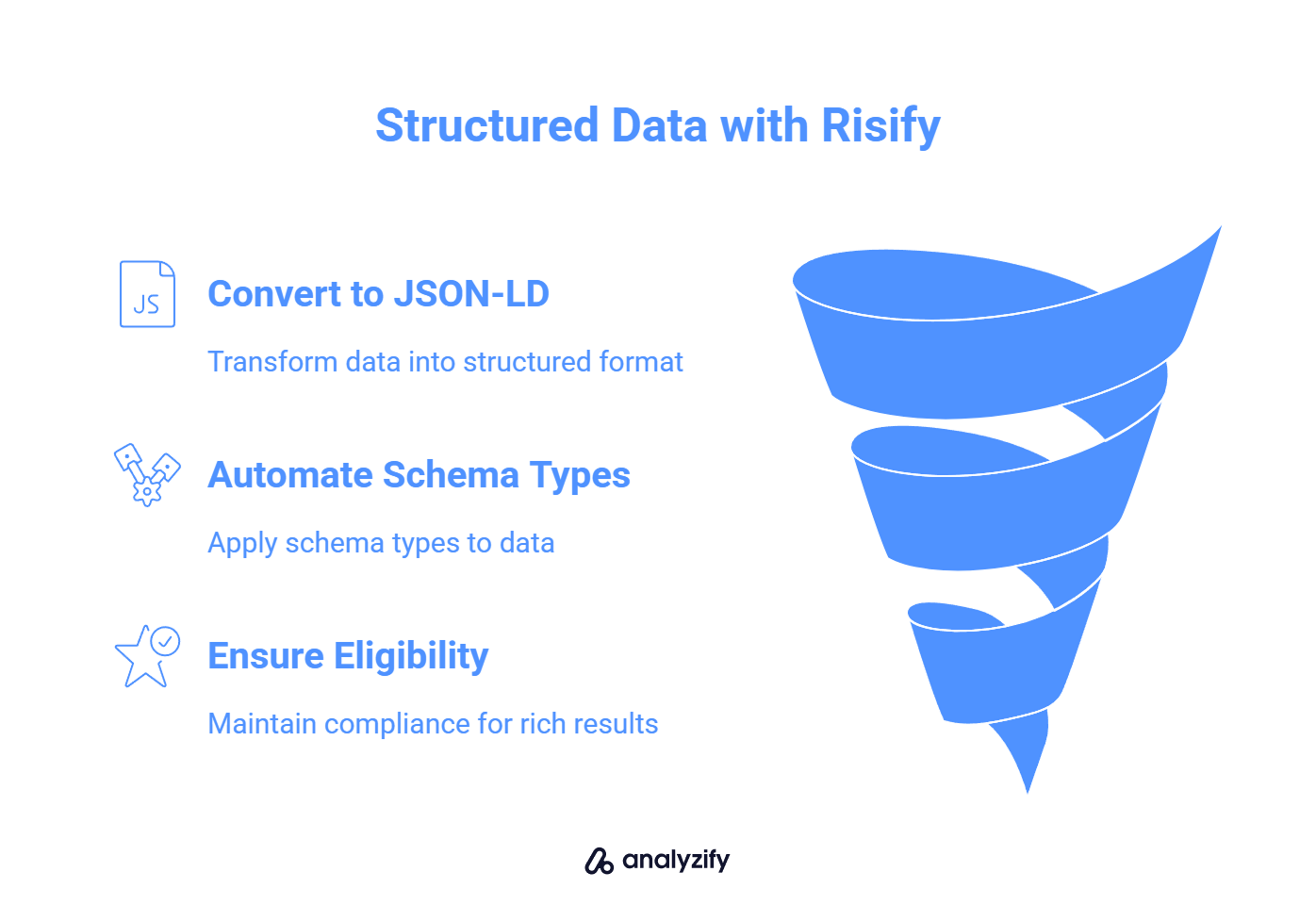
Risify automates the JSON-LD needed for these three high-impact schema types. Product details, breadcrumbs, and FAQs are converted into valid structured data without manual coding, keeping your store eligible for rich results as your catalog and content change.
How to Test and Maintain JSON-LD for Shopify SEO
Implementing structured data is only the first step. To benefit from rich results and avoid issues, your JSON-LD should be tested and monitored regularly.
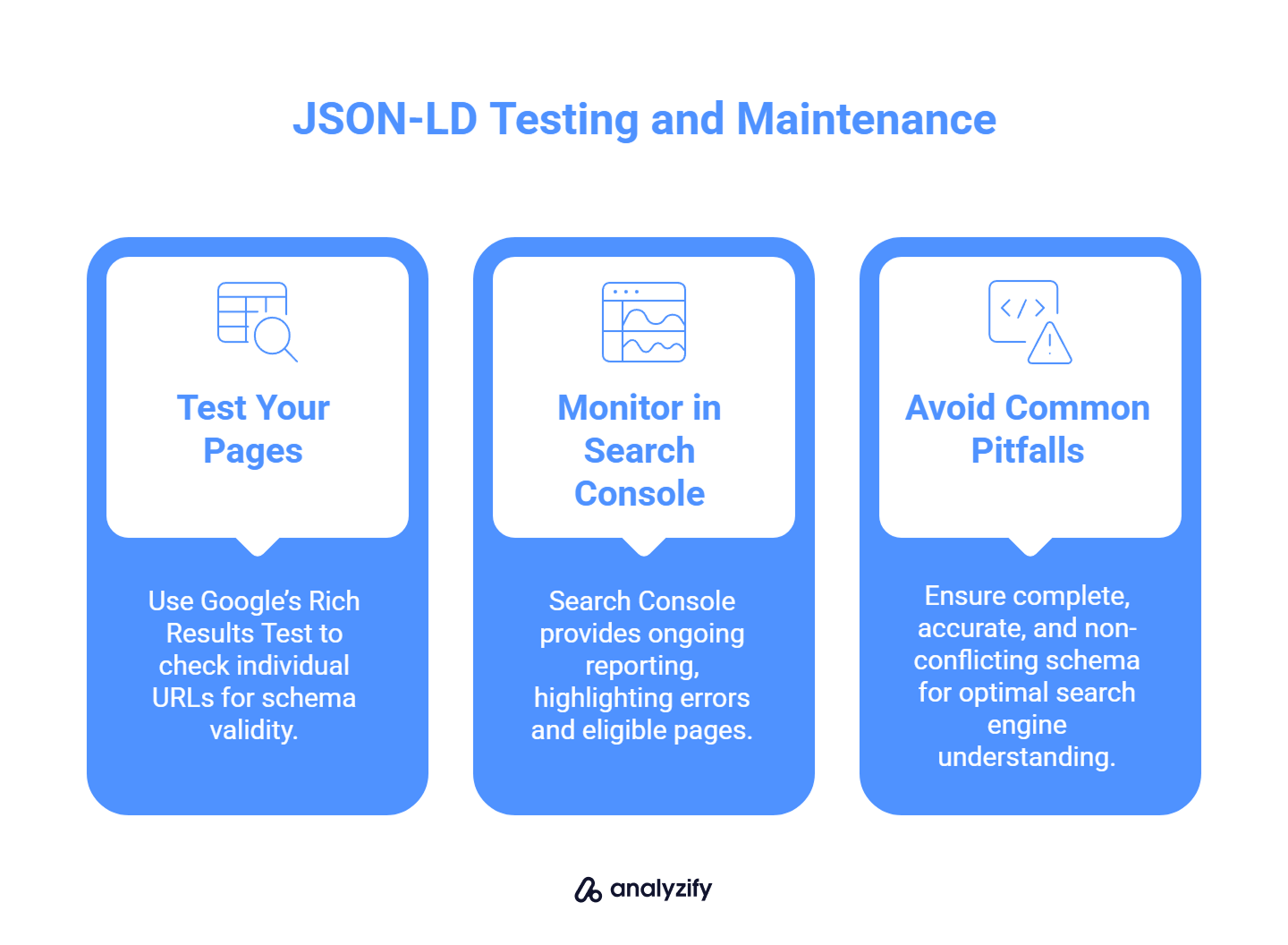
Test Your Pages
Use Google’s Rich Results Test to check individual URLs. This tool shows which schema types Google detects, whether they are valid, and if the page is eligible for enhancements. Testing a sample of product pages, a collection page, and an FAQ page will give a clear overview of your store’s coverage.
Monitor in Google Search Console
After your structured data is live, Search Console provides ongoing reporting. It will notify you of detected schema types, highlight any errors, and show which pages are eligible for rich results. Monitoring helps ensure your structured data continues to work as intended after theme changes or product updates.
Avoid Common Pitfalls
Do not leave incomplete or outdated fields in your schema.
Make sure product data like price and availability matches the visible page content.
Remove conflicting or duplicate schema that can confuse search engines.
How Risify Helps
Risify keeps your structured data consistent and automatically updated as your store content changes. This minimizes the risk of invalid or missing fields, reducing the need for frequent manual adjustments or troubleshooting.
Boost Your Shopify SEO with JSON-LD
JSON-LD is one of the most effective ways to improve Shopify SEO visibility. By providing clear, structured data to search engines, your store becomes eligible for rich results that can increase clicks and customer trust. Product, breadcrumb, and FAQ schema deliver the most impact, and keeping them valid and updated ensures your store continues to benefit.
Get Started with Risify
Risify automates complete JSON-LD coverage for your Shopify product pages, breadcrumbs, and FAQs without any theme edits.
































